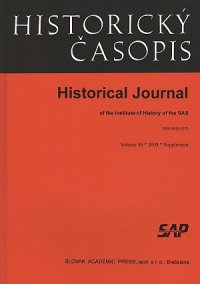Európska doktrína alebo uhorská špecialita? Zásahy štátu a rekatolizácia miest v Uhorsku v priebehu 17. storočia
European Doctrine or Hungarian Speciality? State Interventions and the Re-Catholicization of Towns in Hungary in the Course of the 17th Century
Author(s): István H. NémethSubject(s): History
Published by: Historický ústav SAV
Keywords: History; Kingdom of Hungary; 17th century; Re-Catholicization; towns; elections
Summary/Abstract: The study presents the results of new research on the relationship between the towns and the monarch or the state in the period of re-Catholicization, especially in the second half of the 17th century. At the parliament of 1604, the Hungarian Estates already protested against the Rudolfine Counter Reformation and there was also strong opposition in the free royal boroughs. The argumentation was based on the statement that according to Hungarian general law, the towns “do not belong to the king but to the crown”. At first, re-Catholicization efforts were hindered by a lack of qualified, educated and propertied Catholics, who could hold office in the towns. There was a similar problem with appointment of parish priests in the towns. The author corrects the familiar statements, especially of older historiography, which identified the Reformation with the national party and the Catholic side with the Habsburgs, the Vienna court and the Hungarian Catholic “anti-nationally” oriented nobility, and points to the complexity of the problem, and to the fact that the economic decline of the early modern towns is not a logical result of the weakened authority of town administrations, but of a whole complex of influences.
Journal: Historický časopis
- Issue Year: 2009
- Issue No: 04
- Page Range: 641-658
- Page Count: 18
- Language: Slovak

